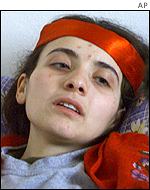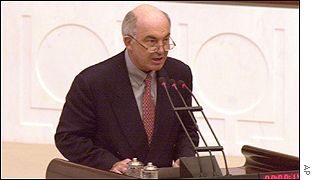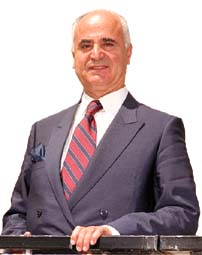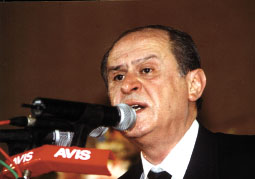26.
August 2002
![]()
2. "Turks and Kurds, Washington's uneasy Iraq allies", those trappings of statehood, coupled with a claim to the oil-rich Iraqi city of Kirkuk as a capital and a plan for a meeting of a united Iraqi Kurdish parliament, rang alarm bells in Turkey where the idea of a Kurdish state is unacceptable.
3. "EUROPE: Dervis opts for party with clean record", Kemal Dervis stepsinto the fray of Turkish politics today after failing to cure its long-standing divisions.
4. "Turkey's tangle with Europe", the European Union's arm-twisting of Turkey over Cyprus is giving ammunition to Turkish nationalist and Islamist politicians and could shake Turkey's already parlous political stability and its pro-Western policy course. Washington should be far more concerned than it appears to be.
5. "Turkey, Iraqi Kurdish Tensions High", talk of a possible U.S. attack on Iraq is exacerbating tensions between Turkey and an Iraqi Kurdish faction - two crucial allies if the United States takes military action against Saddam Hussein's regime.
6. "Electoral ally should be responsible if HADEP gets into parliament: Bahçeli", Deputy Prime Minister also voices opposition to delaying elections.
1. - AFP - "Death toll in Turkish prison hunger strike hits 55":
ANKARA / 26 August 2002
A long-running hunger strike by Turkish prisoners against high-security
new jails claimed its 55th victim when a woman inmate died at the weekend,
a human rights activist said Monday. Gulnihal Yilmaz, 34, died at a
prison in western Turkey where she was serving time for membership of
an extreme-left underground group, the Revolutionary People's Liberation
Party Front (DHKP-C), a spokeswoman for the Turkish Human Rights Association
told AFP.
The DHKP-C is believed to be the main inciter of the protest, launched nearly two years ago by mainly leftist inmates in protest at the introduction of new jails in which one- to three-person cells replaced large dormitories for dozens of inmates. The protestors have been fasting on a rotating basis, taking only liquids with sugar and salt as well as vitamin supplements to prolong their lives. Backed by rights groups, the strikers say the new jails leaves them socially isolated and more vulnerable to torture and maltreatment. The government, however, has categorically ruled out a return to the dormitory system, arguing that it was the main reason behind frequent riots and hostage-taking incidents in the country's unruly jails.
Support for the strike has faded in the face of Ankara's
tough stance and only about 30 inmates linked to the DHKP-C are currently
fasting. The death toll from the strike includes both prisoners and
outside supporters of the movement. Apart from those who have starved
to death, four prisoners burned themselves to death in support of the
strike and another four people died last November in a police raid on
an Istanbul house occupied by hunger strikers. ![]()
2. - Reuters - "Turks and Kurds, Washington's uneasy Iraq allies":
Those trappings of statehood, coupled with a claim to the oil-rich Iraqi city of Kirkuk as a capital and a plan for a meeting of a united Iraqi Kurdish parliament, rang alarm bells in Turkey where the idea of a Kurdish state is unacceptable.
ISTANBUL / 24 August 2002
The looming prospect of upheaval in Iraq has exposed long-simmering
divisions between the Turkish and Iraqi Kurdish allies Washington may
be banking on to help end the rule of Iraqi President Saddam Hussein.
NATO member Turkey and a major Kurdish faction in northern Iraq have been exchanging barbed statements for days in a resurgence of the historic mistrust between the two neighbours.
"Idiocy," was the verdict of Turkey's Sabah daily on reports Iraqi Kurdish leader Massoud Barzani had said Turkey would suffer defeat if it tried to interfere in northern Iraq.
Turkish airbases close to the Iraqi border and Iraqi Kurdish "peshmerga" militia of Barzani's Kurdistan Democratic Party (KDP) could both play roles in any U.S.-led strike on Iraq.
U.S. President George Bush says he wants to oust Saddam but has no firm plans. Turkey, facing economic hardship and polls in November, says it is against any strike on Iraq but is likely to extend at least logistical support.
Barzani failed to attend a White House meeting of leading Iraqi opposition figures last week. The New York Times said this was partly due to Ankara hindering his travel across Turkey.
His absence was a blow for Bush and sign of difference in visions for a post-Saddam future among two elements he may need.
Trappings of statehood
Saddam's fall, while threatening turmoil, may offer Kurds a chance to entrench frail autonomy they have carved out -- with U.S. and reluctant Turkish support -- since the 1991 Gulf War.
For Turkey, ever watchful of rising Kurdish nationalism, that is the very outcome that must be prevented.
"Whether or not the United States attacks Iraq...(northern Iraq) will continue to occupy Ankara," columnist Sami Kohen wrote in the Milliyet newspaper.
Turkey keeps troops in northern Iraq to fight separatist terrorists of the Kurdistan Workers Party (PKK) who have largely withdrawn from Turkey since the capture of their leader Abdullah Ocalan in 1999. More than 30,000 have died since the PKK began a campaign in 1984 for a Kurdish state in southeast Turkey.
Barzani recently issued a draft constitution for Iraq, seeing a flag, parliament and presidency for an Iraqi Kurdistan that would be a largely autonomous part of a federal Iraq.
Those trappings of statehood, coupled with a claim to the oil-rich Iraqi city of Kirkuk as a capital and a plan for a meeting of a united Iraqi Kurdish parliament, rang alarm bells in Turkey where the idea of a Kurdish state is unacceptable.
"The political parties in northern Iraq...must not forget the need to carefully avoid any assertions about the future of the country," Turkey's Foreign Ministry said in a sharply worded statement issued late on Wednesday.
It reminded Barzani that it is a Turkish airbase from which the U.S. and British warplanes that protect his enclave operate.
"The development and security the people of the region have secured in the last 10 years is first and foremost owed to the understanding and cooperation of Turkey," it said.
The KDP says it has tried to convince Turkey it wants to remain a part of Iraq and has no ambitions to full independence.
"We've done what we can to alleviate concerns on every occasion to our friends in Ankara," KDP Ankara representative Safeen Dizayee said recently. "We have no designs other than our declared polices. But time and time again we are accused of a secret agenda of (pursuing) an independent state."
Lingering claims
Kohen was blunt. "Barzani's draft of federal -- practically independent -- status for Iraqi Kurdistan...has deeply disturbed Turkish officials."
Northern Iraq has been outside Baghdad's control since the Kurds there broke away at the end of the 1991 Gulf War.
Neighbouring Turkey has long opposed any moves towards an independent Kurdish state on its southern borders, fearing it might encourage violent separatism among its own Kurds.
Kurds speaking a range of Kurdish dialects live in a swathe of mountainous territory stretching over Turkey, Iraq, Syria and Iran but have never had their own state.
None of the countries where Kurds live want to see them win a state of their own and Kurdish attempts at uprisings across the region have all ended in bloody failure.
The irony is that Turkey has been complicit in sheltering and nurturing the 10 years of de facto Kurdish independence in northern Iraq. The United States sees the Kurds as an important element in the Iraqi opposition and has fostered their autonomy.
But historical ties to northern Iraq run deep, particularly among Turkish nationalists who reflect with nostalgia on Ottoman rule of the entire region. A small ethnic Turkish minority of Turkmens in the region only adds to Turkey's concern.
"That is not a region we are about to sacrifice to
anyone's interests," nationalist Defence Minister Sabahattin Cakmakoglu
said this week. "No matter who is behind them, whatever power,
we as officials of the Turkish Rebublic are here to say, 'No.'"
![]()
3. - Financial Times - "EUROPE: Dervis opts for party with clean record":
By Leyla Boulton / 23 Ausgust 2002
Kemal Dervis stepsinto the fray of Turkish politics today after
failing to cure its long-standing divisions.
The popular former economy minister will join the centre-left Republican People's party (CHP), Turkey's oldest party, established by Mustafa Kemal Ataturk, the founder of the Turkish republic in 1923.
The former World Bank official has for weeks struggled to form a centre-left-liberal alliance in the run-up to elections on November 3. "If unity does not occur, very difficult days await us in November-December," he warned last week.
After turning the economy round following a devastating devaluation last year, he argued that political fragmentation was the biggest obstacle to repairing the debt-ridden economy once and for all. A 10 per cent electoral threshold means that some two-dozen parties are in danger of splitting Turkey's mainstream vote. Economists say the country is in need of domestic stability if it is to avoid an Argentine-style debt default.
Opinion polls put the Justice and Development (Ak) party, suspected by some Turks of harbouring Islamist leanings, in the lead with 20 per cent of the vote. Strict secularism has been a cornerstone of Turkish life ever since Ataturk founded the republic on the ruins of the Ottoman Empire, and set the country on a pro-western modernising course.
With at least another 25 per cent of voters undecided, Mr Dervis's original aim was to provide a credible alternative to the angry and impoverished voters attracted to Ak. "With Ak as the strongest party, opposition to it has to come from the left," says Ismet Berkan, editor of Radikal, a liberal daily.
Mr Dervis had previously promised to join New Turkey, another centre-left party set up by Ismail Cem, the ex-foreign minister. He attributed his change of mind to the CHP leader Deniz Baykal's more sympathetic noises about the need to rally the centre-left.
But with most politicians rejecting the notion of a merger under Mr Baykal, Mr Dervis was probably betting that the CHP had a better chance of running in its own right than New Turkey.
Unlike New Turkey, CHP boasts a well-established network around the country. It is also untainted by the failings of the current government, seen as impoverishing the country with corruption scandals and the devaluation. One recent opinion poll puts the CHP in second place after Ak.
With prospects for the CHP still unclear, however, the question for many investors is whether an Ak-led government would energetically pursue economic reforms championed by Mr Dervis and backed by billions of dollars in loans from the International Monetary Fund. Washington is also trying to gauge Ak support should it pursue military action against Iraq.
Ak, a champion of the poor and oppressed, has vowed to preserve both Turkey's pro-western secular orientation as well as the broad thrust of the IMF-backed reforms. Recep Tayyip Erdogan, the party's leader, is keen to avoid a similar fate to that of his older former boss, Necmettin Erbakan, Turkey's first Islamist prime minister, who was forced to resign by the armed forces in 1997 after a series of provocative Islamist-style gestures.
But an Ak-led government could still, as one Ankara voter put it, "waste time when we have none to lose".
Turkey is under fierce pressure to advance its candidacy to join the European Union which holds a summit on the issue of enlargement on December 11.
A new Turkish government would have days to try to promote a solution to the division of Cyprus before possible EU admission of the Greek Cypriot south of the island would have the effect of wrecking Turkey's relations with the EU.
A government that did not include Mr Dervis, the darling of financial markets, would also have to earn market confidence to enable interest rates to fall sufficiently to fend off the danger of a default on Turkey's unwieldy public sector debt. "Investors will be looking for the continuation of the IMF-backed reforms," notes David Edgerly, executive director of Garanti Securities in Istanbul.
Interest rates shot up in May when Bulent Ecevit, the 77-year-old prime minister, fell ill and his three-party coalition began to dissolve over human rights reforms required by the EU.
"This election is not a referendum about membership of the European Union or any other voter issue," argues Cem Boyner, a prominent businessman who tried to challenge the moribund political system with a new-look liberal reformist movement in 1995. "It is a test of the system itself, of the prudence and common sense of mainstream politicians."
Fears of the outcome however have prompted some Turkish politicians to speculate on the possible postponement of elections. Polls could legally be put off until their original due date of April 2004 by just a simple majority of deputies.
The prospect of an imminent US attack on Iraq could provide
an excuse for such a move. Postponement, however, would do little to
alleviate the market uncertainty that helped precipitate the early polls
in the first place. ![]()
4. - Washington Times - "Turkey's tangle with Europe":
23 August 2002 / by M. James Wilkinson
 The
European Union's arm-twisting of Turkey over Cyprus is giving ammunition
to Turkish nationalist and Islamist politicians and could shake Turkey's
already parlous political stability and its pro-Western policy course.
Washington should be far more concerned than it appears to be.
The
European Union's arm-twisting of Turkey over Cyprus is giving ammunition
to Turkish nationalist and Islamist politicians and could shake Turkey's
already parlous political stability and its pro-Western policy course.
Washington should be far more concerned than it appears to be.
Turkish political progressives are in a mess, and Islamist parties are already tapped to become the strongest single bloc after parliamentary elections scheduled for Nov. 3. Apprehensions over Cyprus not only loom large in the campaign, but are also aggravating regional tensions. This is all bad news for the United States at a time when continued Turkish cooperation is invaluable on several fronts, not least the war against terrorism.
The EU's high-pressure strategy on Cyprus has put Turkey's own membership prospects on the line as inducement for Ankara to extract deal-making concessions from its dependent Turkish Cypriot cousins. Brussels evidently reasons Turkey will not let ethnic bonds to 150,000 Turkish Cypriots stand in the way of its joining the EU. This is a questionable proposition, especially since the trade-off has been weakened by growing doubts over European readiness at the end of the day to accept Turkey.
Moreover, the Europeans have imposed other membership preconditions on Turkey. In response, pro-Western Turkish parliamentarians engineered a pre-election reform package to end the death penalty and improve treatment of minorities. This has fueled high expectations that Brussels will open formal accession negotiations. The EU has been unwilling to do so — if it continues to hold back because of Cyprus among other concerns, backlash will compound Turkey's political woes and could sabotage the reforms.
The EU will issue a formal invitation to the Greek-controlled government of Cyprus in December 2002, and the island's membership will be ratified by 2004. As things now stand, Turkish Cyprus and its garrison of some 30,0000 mainland Turkish troops will be left out in actuality, but covered in a strictly legal sense — this is no mere technicality, since it would sharpen the conflict and put Turkish soldiers on EU soil. The crisis could be avoided by a negotiated settlement between Greek and Turkish Cypriots, but they have been deadlocked for 25 years.
The EU-Turkey-Cyprus tangle has slipped from U.S. attention. Perhaps Cyprus is too complex — or too boring — after 40 years of Balkan-style haggling and recriminations. American apathy is unfortunate because there has been growing attention to Belgium's success as a model for Cyprus in bridging ethnic and linguistic differences. Confronted by similar deep splits between its Flemish and Walloon citizens, Belgium has evolved an extraordinary devolution of power from federal to regional levels while maintaining a unitary state.
Regrettably, the Belgian example has failed to invigorate the Cyprus talks. Turkish Cypriots still demand full sovereignty. Greek Cypriots, who can sit tight and get their EU membership regardless, want a stronger federal structure. More's the pity since Belgium as a functioning democracy within the EU is surely a more viable model than retooling the 1960 Cyprus arrangements, which failed a scant three years later and triggered communal violence.
U.N. Secretary-General Kofi Annan, stonewalled on his first visit to the island in May, will try again with the two Cypriot leaders in Paris Sept. 6. Mr. Annan is a consummate diplomat, but he needs the muscle of member-states to jar the Cyprus talks from their dreary rut. Washington should act now on its vital interest in maintaining a stable, pro-Western Turkey. The first step should be an all-out diplomatic offensive for a breakthrough at Mr. Annan's Paris meeting. At a minimum the sides ought to agree on what the government of a reunified Cyprus will look like. The Belgian model should not be rejected without good reason or acceptable alternative.
To follow up once a new government emerges after the November Turkish elections, Washington should consider convoking all parties — Cypriots, Greece, Turkey, the EU and the U.N. It may not be possible to solve all aspects of the Cyprus problem, but it will be essential to provide for the smooth transition of Turkish Cyprus into the EU, whether with or after the Greek Cypriots, and to work out an agreed role for Turkey.
Washington has a full plate and doubtless little desire to take on hoary Cyprus dilemmas. But no one else has the stature to do so, and if not soon defused, the question of Turkish Cyprus could haunt the United States by undermining Turkey's political stability and affecting Ankara's ability to work with the West.
M. James Wilkinson is a former U.S. special Cyprus
coordinator and deputy representative to the U.N. Security Council.
This comment is drawn from an essay for a forthcoming Century Foundation
book on Turkey. ![]()
5. - AP - "Turkey, Iraqi Kurdish Tensions High":
ANKARA / 23 August 2002
Talk of a possible U.S. attack on Iraq is exacerbating tensions
between Turkey and an Iraqi Kurdish faction - two crucial allies if
the United States takes military action against Saddam Hussein's regime.
Turkey is worried that the Iraqi Kurds, who run an autonomous zone in northern Iraq, would try to carve out their own state if Saddam is overthrown. Turkish officials fear that would encourage Kurdish separatist movements in Turkey.
The tensions could complicate Washington's efforts to build an anti-Saddam coalition because Turkey is home to a key air base that U.S. warplanes use to patrol a no-fly zone over northern Iraq. Washington is also apparently interested in using former Iraqi air bases in the Kurdish enclave.
Turkey fought Kurdish guerrillas for 15 years in the southeast of the nation, which borders northern Iraq, and says that a Kurdish state would serve as an inspiration for the rebels.
The Iraqi Kurds fear Turkish domination and have been
angered by recent statements by some Turkish nationalist politicians
suggesting that oil-rich areas of northern Iraq, including the Kurdish
enclave, should be part of Turkey.
Northern Iraq was part of the Ottoman Empire for centuries and some
Turkish nationalists have questioned the treaty that put the area in
Iraq and not Turkey after the collapse of the empire following World
War I.
``It is an area which had been forcibly separated,'' Defense Minister Sabahattin Cakmakoglu said Tuesday. ``Northern Iraq is under our safekeeping.''
The statement sparked outrage from the Kurdistan Democratic Party, which controls about half of the autonomous enclave in northern Iraq.
The KDP warned that it will turn northern Iraq into a ``graveyard'' for the Turks if they enter. The KDP is believed to be able to mobilize some 40,000 fighters.
Turkey also recently announced that it is choking off vital border trade that is a critical source of funding for the KDP.
Diesel imports from the Kurdish region ended in February and Turkish officials announced last week that the trade will not be restarted. The Kurdish enclave depends on the smuggling of diesel to Turkey for a large part of its income. Sources say that the KDP has only been able to pay half the salaries of officials due to the cutoff in trade.
``Do they expect to implement their own filthy objective in the U.S. attack on Iraq?'' Brayeti, the KDP's newspaper asked in an editorial. A translation of the Kurdish-language editorial was released on a Kurdish website close to the KDP and verified by a KDP official.
``Let them try their luck in today's Kurdistan. They will ... witness that this nation will turn ... Kurdistan into a graveyard for those who attack it,'' the newspaper said.
Turkish analysts seemed surprised by the harsh tone of the KDP's reaction.
KDP leader Massoud Barzani ``should understand that he does not have the luxury to lose the support of Turkey,'' columnist Sami Kohen wrote in Thursday's Milliyet newspaper. ``It would very useful for the U.S. to remind him of this again.''
Turkish media have reported that Turkey recently refused
to renew Barzani's diplomatic passport. A Turkish intelligence source
confirmed that report. As Iraqi citizens living in territory that is
not controlled by the Iraqi government, most Kurds travel on old or
forged Iraqi passports. ![]()
6. - NTV / MSNBC - "Electoral ally should be responsible if HADEP gets into parliament: Bahçeli":
Deputy Prime Minister also voices opposition to delaying elections.
26 August 2002
Any party that assisted HADEP to win representation in the new parliament
should bear the responsibility of their actions, according to Deputy
Prime Minister Devlet Bahçeli, the chairman of the far right
Nationalist Movement Party (MHP).
Responding to reports that the pro-Islamist Prosperity Party (SP) was discussing the possibility of forming an election with the pro-Kurdish People’s Democracy Party (HADEP), Bahçeli said that an electoral ally of HADEP should also face the consequences of any fallout from the party being in the parliament.
“A political party that carries the People’s Democracy Party to the parliament, should undertake responsibility of the HADEP,” he said while speaking on Turkish private television station TV8 on Sunday. There are allegations that HADEP has links with the outlawed separatist organisation the PKK, also known as KADEK. A former pro-Kurdish political party, the DEP, was banned by the courts and its deputies removed from parliament, with many being gaoled, after being found guilty of having ties to separatism.
The MHP chairman also took a swipe at those supporting putting off the elections until a later date, saying that the poll was the to be a reflection of the wishes of the Turkish people. “It is meaningless to escape from the elections. We have to rely on the will of our people. Our government’s last and most meaningful duty should be holding a healthy and peaceful election.”
Bahçeli also poured cold water on expectations that Turkey would be given a date to begin accession negotiations with the European Union, saying instead that the country should slow the pace of the reforms it was implementing to try and qualify for membership and give more attention to the Cyprus issue.
“Turkey’s taking a full membership negotiation
schedule is not possible. We should not be a Turkey trying to do everything
that the EU wants. We should be a country explaining its own views.
I also want to ask a question: Will this parliament convene and give
up Cyprus? An answer should be found to this question.” ![]()